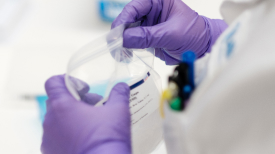- Cancer Care Team
Cancer Care Team
To deliver optimal patient outcomesProducts and Services
Cancer Type
Supplies & Tools
Scientific Focus
- Biopharma Partners
- Patients
- Education & Events
- Login
- Contact Us
CPT 81235; 88381
Synonyms
- Erlotinib Responsiveness in NSCLC, EGFR Mutation Analysis
- Gefitinib Responsiveness in NSCLC, EGFR Mutation Analysis
- IRESSA® Responsiveness in NSCLC, EGFR Mutation Analysis
- Non−Small-cell Lung Cancer, EGFR Mutation
- Tarceva® Responsiveness in NSCLC, EGFR Mutation Analysis
Test Details
 Cancer Type
Cancer Type
Lung, Non-small cell lung cancer
 Technology Used
Technology Used
Molecular
 Turnaround Time
Turnaround Time
5 - 7 days
Use
In non-small cell lung cancer, many mutations in EGFR are associated with responsiveness to EGFR tyrosine kinase inhibitor (TKI) therapy. In contrast, some mutations in EGFR are associated with resistance to EGFR TKI therapy, including T790M and EGFR exon 20 insertions. The T790M mutation is a known mechanism of resistance and is commonly associated with relapse following initial therapy with EGFR TKI.
Special Instructions
Please provide a copy of the pathology report. Please direct any questions regarding this test to customer service at 800-345-4363. A subsequent blood sample may be requested in order to confirm the somatic origin of an identified mutation.
Limitations
The EGFR test is designed to detect mutations in exon 18, 19, 20, and 21 of the EGFR gene. These mutations account for >99% of all reported EGFR mutations in NSCLC patients. Samples with results reported as "no mutation detected" may harbor EGFR mutations that are not detected by the assay.
Detection of mutation is dependent on sample integrity and the amount of amplifiable DNA present in the specimen. The methods used in this assay are highly selective and, depending on the total amount of DNA present, can detect approximately 2% to 20% of mutant in a background of wild-type genomic DNA.
This test was developed, and its performance characteristics determined, by LabCorp. It has not been cleared or approved by the US Food and Drug Administration (FDA).
Methodology
SNaPshot Multiplex PCR (primer extension-based method)
Specimen Requirements
Information on collection, storage, and volume
Specimen
Formalin-fixed, paraffin-embedded (FFPE) tissue block or slides from NSCLC
Volume
Five unstained slides and one matching H&E-stained slide at 10 μM or formalin-fixed, paraffin-embedded tissue block
Minimum Volume
Two unstained slides and one matching H&E-stained slide at 10 μM (Note: Samples with >4 mm² and ≥50% tumor content are preferred.)
Container
Slides or blocks
Storage Instructions
Submit blocks/slides at room temperature.
Causes for Rejection
Tumor block containing insufficient tumor; tissue or tumor fixed in a heavy metal fixative; broken or stained slides
Related Tests
Find more tests related to this one.





